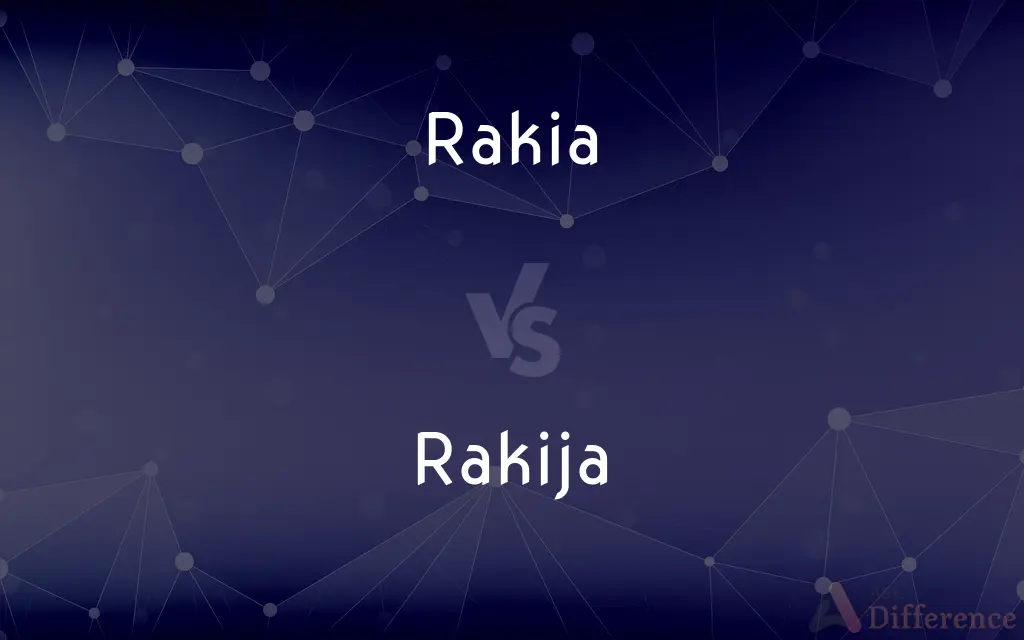Rakia vs. Rakija — What's the Difference?
By Fiza Rafique & Maham Liaqat — Updated on May 9, 2024
Rakia and rakija refer to the same type of fruit brandy popular in the Balkans, with the spelling differences primarily reflecting language variations in different countries.

Difference Between Rakia and Rakija
Table of Contents
ADVERTISEMENT
Key Differences
Rakia, commonly spelled in countries like Bulgaria and Serbia, refers to a strong fruit brandy enjoyed across the Balkan region. Rakija, on the other hand, is the preferred spelling in Croatia and Bosnia and Herzegovina, yet it denotes the same spirit.
Both rakia and rakija are traditionally homemade, often using fruits like grapes, plums, or apricots. However, the exact fruits and distillation process can vary slightly between regions, affecting the final taste and potency of the drink.
The production of rakia involves fermenting the fruit, distilling the mash, and sometimes aging the distillate in wooden barrels. Rakija follows the same production steps, highlighting how cultural practices surrounding this beverage are shared widely, despite linguistic differences.
The alcohol content in both rakia and rakija typically ranges from 40% to 60%, depending on whether it is commercially produced or homemade. The stronger versions are usually found in rural areas where traditional methods are preserved.
Rakia is often consumed as a welcome drink and at celebrations, indicating its integral role in social and cultural rituals in the Balkans. Similarly, rakija is enjoyed during significant events and gatherings, reinforcing its cultural significance across different regions.
ADVERTISEMENT
Comparison Chart
Country of Origin
Bulgaria, Serbia
Croatia, Bosnia and Herzegovina
Spelling Variations
"Rakia" often used
"Rakija" commonly adopted
Fruit Used
Grapes, plums, apricots, others
Grapes, plums, apricots, others
Production
Fermentation, distillation, aging
Fermentation, distillation, aging
Cultural Significance
Integral to social rituals
Essential in cultural celebrations
Compare with Definitions
Rakia
Often homemade and varies in strength.
They offered us homemade rakia, which was surprisingly strong.
Rakija
Fruit brandy popular in parts of the Balkans.
In Croatia, rakija is commonly made from apricots.
Rakia
Consumed as a traditional welcome drink in many Balkan countries.
Guests are often greeted with a glass of rakia.
Rakija
Known for its high alcohol content.
The rakija we tried in Bosnia was exceptionally potent.
Rakia
A type of fruit brandy from the Balkans.
Rakia is traditionally served at Bulgarian weddings.
Rakija
Integral to cultural practices and hospitality.
Offering rakija is a sign of hospitality in many Balkan homes.
Rakia
Distilled alcoholic beverage made from fermented fruits.
His grandfather makes rakia from old plum trees every year.
Rakija
Alcoholic drink produced by distilling fermented fruits.
They produce rakija in small batches to preserve its unique flavor.
Rakia
Associated with social and cultural events.
Rakia is indispensable at local festivals.
Rakija
Served at celebrations and family gatherings.
Rakija flows freely during festive occasions.
Rakia
Rakia, Rakija or Raki (), is the collective term for fruit spirits (or fruit brandy) popular in the Balkans. The alcohol content of rakia is normally 40% ABV, but home-produced rakia can be stronger (typically 50%).
Rakija
A strong distilled alcoholic beverage made from various fruits, varieties of which (such as slivovitz) are found across the Balkans and the Mediterranean.
Rakia
Alternative spelling of rakija
Common Curiosities
Which countries are famous for rakia and rakija?
Rakia is notably from Bulgaria and Serbia, while rakija is prevalent in Croatia and Bosnia and Herzegovina.
Is there a difference in taste between rakia and rakija?
The taste can vary by region and recipe, not necessarily by the name.
Are there commercial versions of rakia and rakija?
Yes, both spirits are commercially produced as well as traditionally homemade.
How should rakia or rakija be served?
Traditionally, they are served chilled and often at the beginning of a meal or with appetizers.
What is the legal alcohol minimum for rakia and rakija?
Typically, the alcohol content must be 40% or higher.
Does the distillation process differ between regions?
The basic steps are consistent, but small differences exist based on local customs.
How do locals use rakia or rakija in culinary practices?
Apart from drinking, it is sometimes used in cooking or as a dessert accompaniment.
Can rakia or rakija be made from any fruit?
Yes, though grapes and plums are the most common, various fruits can be used depending on local preferences.
Is there an aging process involved in making rakia or rakija?
Yes, some varieties are aged in wooden barrels to enhance flavor.
Is rakia or rakija suitable for mixing in cocktails?
Yes, it can be used in cocktails though it is traditionally consumed neat.
Is there any regulation on homemade rakia or rakija production?
Local laws vary, but in many areas, traditional homemade production is allowed.
How does rakia compare to other fruit brandies?
Rakia is similar to other fruit brandies but has unique regional characteristics.
Is there a specific time of year for making rakia or rakija?
Production often coincides with the fruit harvest season.
Can rakia or rakija be found outside the Balkans?
It is increasingly available in international markets due to the diaspora and export demand.
Share Your Discovery

Previous Comparison
Roast vs. Rost
Next Comparison
Dicloxacillin vs. CloxacillinAuthor Spotlight
Written by
Fiza RafiqueFiza Rafique is a skilled content writer at AskDifference.com, where she meticulously refines and enhances written pieces. Drawing from her vast editorial expertise, Fiza ensures clarity, accuracy, and precision in every article. Passionate about language, she continually seeks to elevate the quality of content for readers worldwide.
Co-written by
Maham Liaqat















































